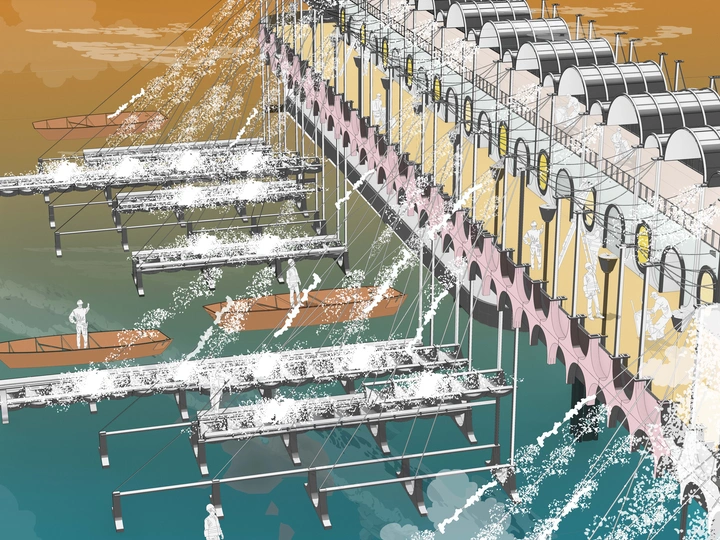Salt of The Thames - A collective ownership model

Growing up along the ever-changing shores of the Black Sea, I developed a profound appreciation for its crucial role in sustaining life on Earth. This upbringing ignited my passion for climate adaptation, particularly in relation to water management. I explore innovative design approaches that harness water as a transformative tool, reimagining traditional paradigms of usage and management.
Believing we've surpassed the point of mere climate mitigation, I advocate for comprehensive adaptation strategies, on multiple scales. Employing systems thinking methodologies, I speculate on alternative futures, blending qualitative and quantitative research with creative mediums like climate fiction and cinema.
My research project, 'Designing Disorder,' nominated for the Norman Foster Scholarship during my MArch at the London School of Architecture, exemplifies this approach. It proposes adaptive design strategies that embrace flooding, transforming cities into responsive landscapes. Currently, my ongoing project 'Coastland 2.0' reimagines coastal cities' adaptation to rising sea levels, earning a nomination for the RIBA Future Architects Writing competition.
My dedication to climate adaptation is enriched by my multi-disciplinary background in architecture, with experiences spanning Denmark, Milan, and London. In my current role, I specialize in adapting historically listed buildings in Central London. Previous engagements include research and competition projects addressing housing crises, migration, and the future of work, earning recognition for their innovative approaches.
My journey is driven by a fervent belief in the transformative power of climate adaptation, rooted in a rich tapestry of multi-disciplinary experiences and a deep connection to the natural world. I am deeply committed to furthering my work in climate adaptation.
Inspired by the "We Own It" campaign of 2018, which advocated for public ownership of public services, the project in London addresses global water scarcity issues. It aims to educate visitors on the poetic process of desalination and co-production of salt, while also showcasing the symbiotic relationship between these processes and the community's public programs, where these their by-products occur: including mussel farms, oyster bars, and a vibrant community market during an annual Salt Fair.
The project's title, 'Salt of the Earth,' draws from the biblical saying, signifying individuals of great worth and reliability. In this context, cooperatives reclaim the Thames as a common good, redefining community and ownership. These cooperatives, supported through common rituals and a crowdfunding campaign, embody the project's ethos of mutual relations and valuing diverse forms of labor.
Ultimately, my goal is to create a knowledge-based economy, rather than a profit-based one. On a human scale, by producing salt - a commodity so cheap that is exported in the city in the most laborious way, can only stand as a manifest for the most human of all enterprises and for what our relationship to our resources should be.